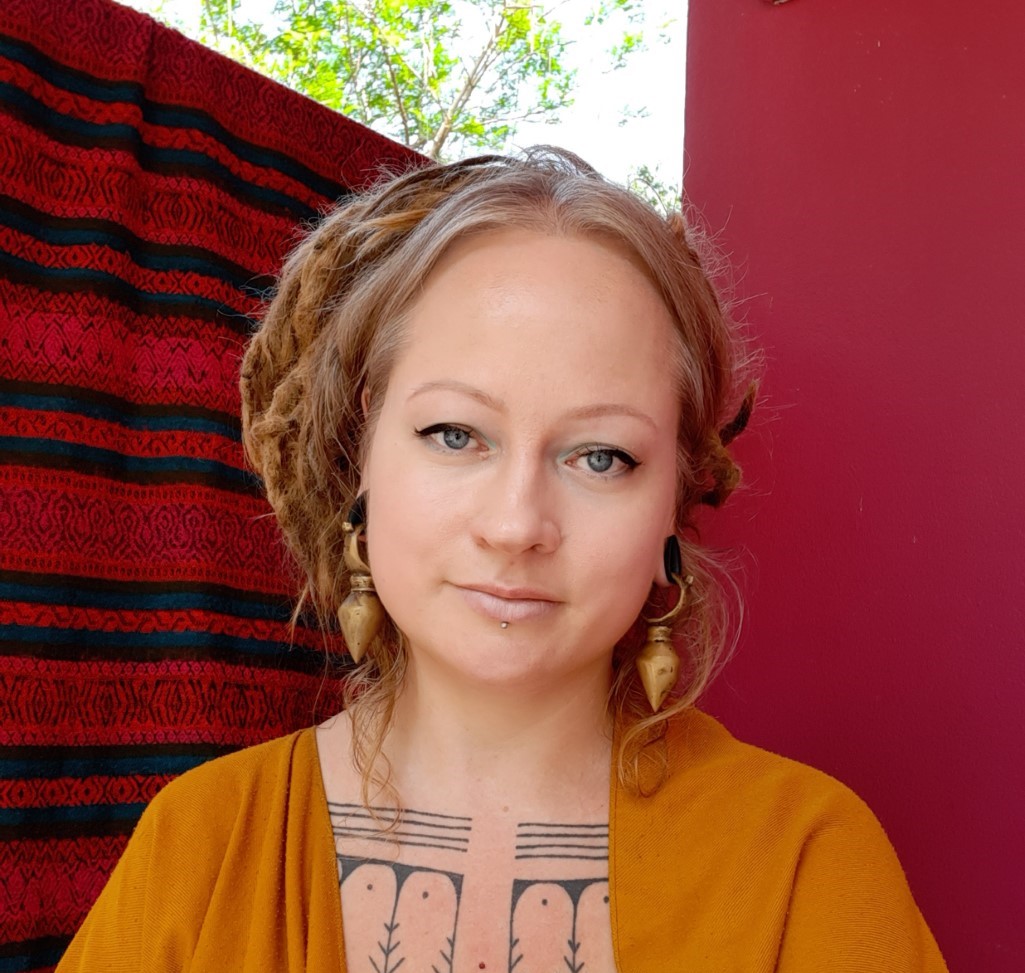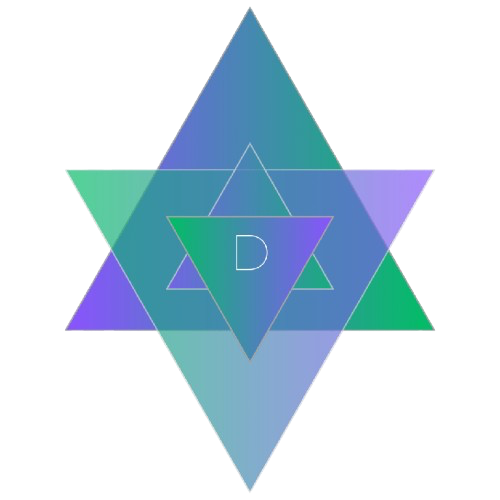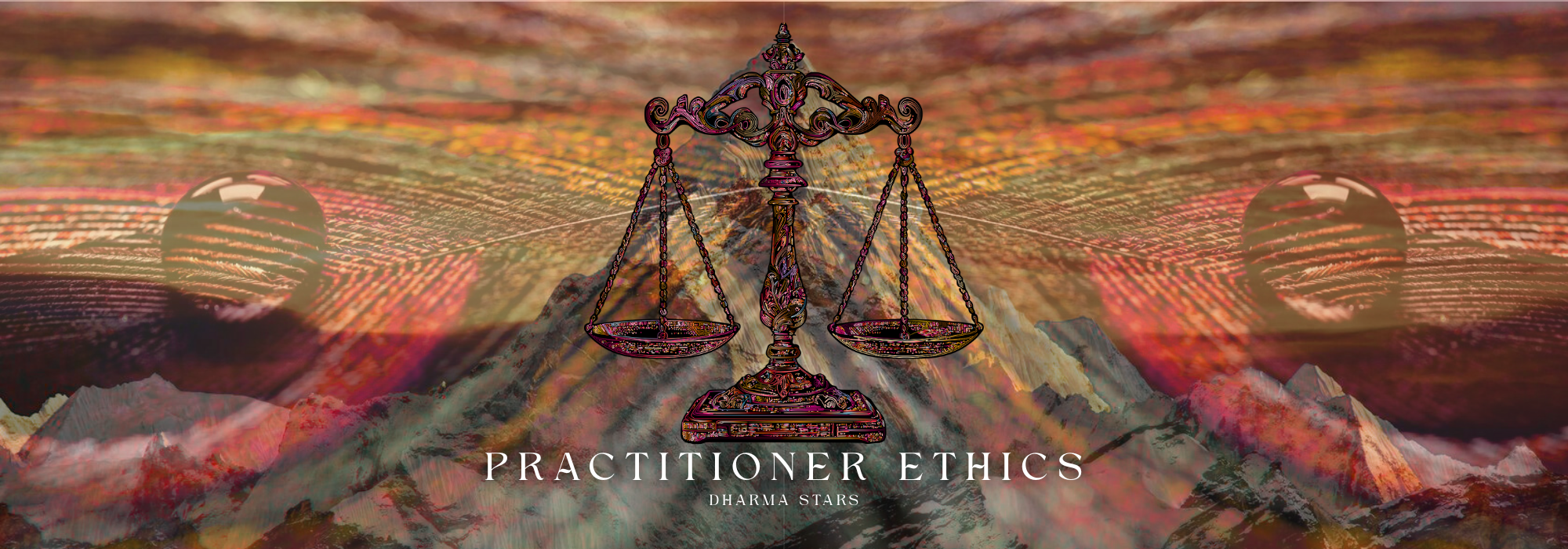
To be a practitioner means to know about conduct, ethics with working with peers, with different groups and keeping the ego in check.
PRACTITIONER ETHICS
Why Ethics?
Ethics are fundamental in healing, multidimensional, and therapeutic work, especially in today’s world where individuals are navigating increasingly complex personal and collective challenges. As practitioners, we hold significant responsibility when working with clients who may be in vulnerable states—physically, emotionally, or spiritually. Ethics serve as a guiding framework to ensure that the care provided is respectful, non-exploitative, and rooted in the best interests of those we support. By maintaining clear boundaries, confidentiality, and integrity, practitioners foster trust and create a safe space for authentic healing to occur.
In the current era of rapid spiritual awakening and widespread access to esoteric practices, the need for ethical awareness has never been greater. Without ethical grounding, there is a risk of unintentionally causing harm—whether through cultural appropriation, overstepping professional capacity, or allowing ego-driven motives to cloud judgment. Ethics help practitioners remain centered, ensuring they approach their work with humility, self-awareness, and respect for diverse cultural, spiritual, and emotional experiences. Ultimately, ethical practice is the foundation of responsible and effective healing, allowing both the practitioner and client to engage in a process that is empowering, inclusive, and transformative.
Good ethics as sacred activism and keys to a Golden Age
In the coming times, as the collective consciousness evolves and people seek deeper, more authentic healing experiences, clients are increasingly likely to choose practitioners who demonstrate a strong commitment to ethics in the healing arts. Ethical practitioners exude a sense of safety, trustworthiness, and groundedness, qualities that are essential for fostering meaningful therapeutic relationships.
Clients will naturally gravitate toward those who have taken the time to develop their ethical awareness, as this reflects a dedication to integrity, cultural sensitivity, and the ability to hold space responsibly. Moreover, having a solid ethical framework is not only vital for client safety but also for the practitioner’s own well-being and spiritual development. Practicing with clear boundaries, humility, and self-awareness prevents burnout, supports emotional regulation, and fosters a deeper alignment with one’s higher purpose. Ethics serve as a compass, guiding practitioners to act from a place of compassion and authenticity, enabling their growth as both healers and individuals.
Transitioning into Ethical Practice
In these transformative times, many individuals are drawn to therapeutic and spiritual vocations. This shift often stems from natural gifts, intuition, and a deep desire to help others. However, while these attributes are valuable, they are not sufficient preparation for the ethical and practical realities of professional practice.
Being a practitioner involves much more than simply offering help—it requires a thorough understanding of conduct, ethics, and the dynamics of working with peers, diverse client groups, and within one’s own personal limitations. A common challenge for emerging practitioners is navigating over-enthusiasm, which can lead to ungrounded work or an inflated sense of their capacity.
To address these challenges, Dharma STARS bring you this ethics course to ensure you can become mindful and strive for impeccability in your work. This course serves as a foundation for self-enquiry and for piloting small-scale interactions with clients from a safer and more informed footing. By fostering awareness of ethical principles and personal responsibility, this course helps practitioners build a strong foundation for their journey.
The course includes teachings on:
Privacy and Confidentiality
Privacy and Confidentiality
Disclosure
Disclosure
Safeguarding
Safeguarding
Practitioner Levels of Disclosure
Practitioner Level of Disclosure
Transference / Counter Transference
Transference / Counter Transference
Sympathy or Empathy and the Sacred Neutral
Sympathy or Empathy and the Sacred Neutral
Divination and Ethics
Divination and Ethics
Privilege, Decolonisation and Spiritual Bypassing
Privilege, Decolonisation and Spiritual Bypassing
Refugee Awareness
Refugee Awareness
Boundaries
Boundaries
Mapping Yourself, Others, and Spaceholding
Mapping Yourself, Others, and Spaceholding
Knowing Self – Knowing Parts
Knowing Self – Knowing Parts
Power Dynamics in the Workplace
Power Dynamics in the Workplace
Space-Holding, Intention Setting and Space Opening
Space-Holding, Intention Setting and Space Opening
Ethics and Social Media
Ethics and Social Media
Ethics and Protocols for Multidimensional Practitioners
Ethics and Protocols for Multidimensional Practitioners
These teachings are geared to help people understand the evolutionary leap to create causes and conditions to bring the Golden Age

Privacy and Confidentiality
Privacy and confidentiality are fundamental principles in therapeutic contexts because they create a safe and trusting environment where clients feel secure enough to open up about deeply personal, sensitive, and sometimes traumatic experiences. When clients know that their thoughts, feelings, and experiences will not be shared without their consent, they are more likely to engage in the therapeutic process and explore difficult subjects.
Confidentiality is essential for maintaining respect for the client’s autonomy and dignity, ensuring that they have control over their personal information and how it is used. Without a clear understanding of privacy, clients may feel exposed or vulnerable, which can undermine the therapeutic relationship and hinder progress.

DISCLOSURE
This presentation explores the role of referrals and bridging tools for trauma-informed practitioners. We will examine the concept of referrals, including their purpose and the circumstances under which and when a referral is appropriate. The discussion will cover referral protocols for multidisciplinary practitioners, grounded in both psychotherapeutic and clinical perspectives, as well as general ethical standards, while at the same time addressing some of the current challenges within the healing community.

safeguarding
Safeguarding is an essential component in all therapeutic settings, ensuring the physical, emotional, and psychological safety of both clients and practitioners. In therapeutic work, individuals often share deeply personal, vulnerable aspects of their lives, and without robust safeguarding protocols in place, there is a risk of exploitation, harm or abuse. Practitioners must be proactive in establishing clear boundaries, informed consent, and confidentiality agreements, while also being aware of any potential signs of distress or danger within the therapeutic relationship.

Practitioner Level of disclosure
In this presentation Padma Khandro Victoria and Maaike de Haan discuss practitioner ethics within the context of the field of Divination. For example, avoiding sensationalising – or proving that you see it all.
Topics that are discussed include: Privacy and Confidentiality, Disclosure, Safeguarding, Practitioner level of Disclosure, Transference / Counter Transference, Setting up your Practice, Aftercare Protocols / Referrals

Transference / Counter transference
Transference and countertransference are important concepts in therapeutic settings, as they play a significant role in the dynamics between practitioner and client. Transference occurs when a client unconsciously projects feelings, experiences, or expectations from past relationships onto the therapist or practitioner. For example, a client might view the practitioner as a parental figure, transferring unresolved feelings from their relationship with a parent onto the therapeutic relationship. This can affect how the client behaves, reacts, and processes information in therapy, and if not addressed, can create distortions in the therapeutic work.

Sympathy or empathy and the sacred neutral
Empathy is a critical quality in therapeutic settings because it allows the practitioner to deeply understand and resonate with the client’s emotions and experiences without losing the ability to remain objective or neutral. Unlike sympathy, which can involve feeling pity or sorrow for someone, empathy creates a space where the client feels truly heard and supported, but not patronized or diminished. Sympathy can unintentionally place the practitioner in a superior position, reinforcing power imbalances and potentially disempowering the client. In contrast, empathy fosters a collaborative and equal relationship where the practitioner validates the client’s experience, while still holding the necessary boundaries to guide and support them.

divination and ethics
In this presentation Padma Khandro Victoria and Maaike de Haan discuss practitioner ethics within the context of the field of Divination.
Topics that are discussed include: Privacy and Confidentiality, Disclosure, Safeguarding, Practitioner Level of Disclosure, Transference / Counter Transference, Setting up Your Practice, Aftercare Protocols / Referrals

Privilege, Decolonisation and Spiritual Bypassing
In this presentation Padma Khandro Victoria and Maaike de Haan discuss practitioner ethics within the context of the field of Divination.
Topics that are discussed include: Privacy and Confidentiality, Disclosure, Safeguarding, Practitioner Level of Disclosure, Transference / Counter Transference, Setting up Your Practice, Aftercare Protocols / Referrals

Refugee Awareness
Refugee awareness is crucial in working inclusively because it helps practitioners understand the unique challenges and experiences faced by individuals who have been displaced due to war, persecution, or violence. Refugees often carry trauma that affects their emotional, psychological, and physical well-being in complex ways, which requires sensitivity, empathy, and cultural competence from the practitioner.

boundaries
Developing healthy boundaries is vitally important for practitioners in the healing arts, especially because they are often highly empathetic and deeply attuned to the emotional and energetic needs of their clients. Without clear boundaries, empathetic practitioners can easily become overwhelmed or over-extended, absorbing their clients’ emotions or energies, which can lead to burnout, compassion fatigue, or emotional entanglement.
Healthy boundaries allow practitioners to protect their own well-being while still providing compassionate, effective support to clients. They create a necessary separation between the practitioner’s personal experience and the client’s process, ensuring that the work remains focused, professional, and grounded.

Mapping Yourself, Others and Space-holding
Know thyself and what sort of character type you are so you can evaluate the ideal clients and settings. Padma Khandro discusses the developmental stages that we may go through when experiencing awakening / a consciousness shift.
Navigating awakening has its own pitfalls and delusions. Many practitioners are becoming more intuitive and connected to their multidimensional self in these times. This is perfectly normal and available for everyone. How do you deal with your own Chosen One narrative and that of others around you?

Knowing Self – Knowing Parts
Understanding Parts, as outlined in Internal Family Systems (IFS), and Self-Energy is critically important for being a robust, ethical practitioner because it enables one to recognize and navigate their own internal dynamics, such as sub-personalities, wounds, and triggers, ensuring they approach clients with neutrality, empathy, and clarity while avoiding projections or over-identification with the client’s experiences.

Power Dynamics in the Workplace
Padma Khandro Victoria and Maaike de Haan explore the contemporary application of Ethics, Natural and Tribal Law in a modern day neo-Tribal context; the world of Tattooing. This being an intersection of many worlds, an ancient tradition in many cultures and tribes around the globe, which, in our communities today, brings in people from all walks of life.
They discuss how Maaike’s apprenticeship in tattooing really landed her with fundamental and universal ethical principles. And how the world of Tattooing, as well as the different other ‘underworlds’, subcultures and scenarios they’ve both worked in, once deconstructed, are in fact all the same as many indigenous tribal contexts.

Space-holding, Intention Setting and Space Opening
Opening space is a foundational practice in multidimensional work, and while it may not be as emphasized in conventional psychotherapeutic settings, it is of crucial importance for those training in the healing arts and metaphysics. In these fields, practitioners engage with the subtle realms of energy, emotion, and spirit, where clients’ experiences often extend beyond the physical body and conventional therapeutic structures. Opening space involves intentionally creating a safe, sacred, and energetically clear environment, where the practitioner consciously aligns with the client’s process and sets the tone for healing. This ritualistic act of spaceholding helps to establish boundaries, facilitate a deeper connection, and invite the appropriate energies or insights to flow, allowing the healing work to unfold naturally.

Ethics and Social Media
In this section, we delve into the ethical implications of using social media as a tool for promoting therapeutic and healing work. Focusing on the delicate balance between personal branding and maintaining professional boundaries, this lesson delves into how overexposing your personal image can impact trust, confidentiality, and the therapeutic relationship. We also explore the concept of “energy harvesting,” where practitioners may unknowingly or knowingly exploit their audience’s emotional or energetic investments for personal gain. You’ll gain insights into how to maintain a grounded, authentic online presence that stays true to your ethical responsibilities, avoiding the temptation to create a persona that deviates from your true values, all while navigating the complexities of marketing in a digital age.

Ethics and Protocols for Multidimensional Practitioners
Basic Ethics for Practitioners explores the evolving ethical landscape of modern healing and therapeutic practices in today’s changing times, particularly within the context of the Kali Yuga—a time of deep transformation and upheaval. We then delve into the role of the ego in practice and emphasise the importance of keeping it in check to ensure a grounded, ethical approach when working with clients. We then examine the concept of non-duality, unpacking why it is a critical lens through which practitioners must approach their work—both for personal integrity and the well-being of clients. Practitioners will also be introduced to the concept of multidimensionality, exploring their responsibilities when working across different planes of existence, including interactions with clients and entities. This session provides essential guidance for navigating these complexities with awareness, responsibility, and ethical clarity.
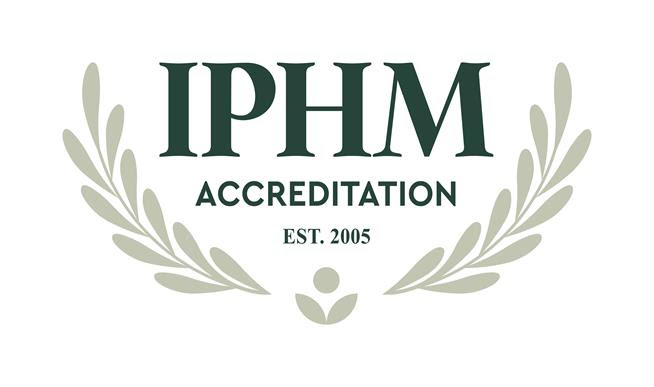
Recorded Course
- 16h of teaching material
- recorded teachings of all sections
- option for certification
The energy exchange is calculated upon an income between £15k and £23k a year.
We have two extra fees available, please contact us if you fall under the following categories:
Reduced program fee: £288, for those with a lower income
Sustainer: £333, for those with higher income, please consider donating more to help support and make it possible for those in need to receive these teachings at a lower rate.
We are ok with a payment plan. The normal energy exchange for that is £335 in total. The rate differs from when you pay in full. If you need a payment plan, please contact us to set this up at dharmastars.org@gmail.com
If you are experiencing hardship then please get in touch and we can look into another arrangement.
Important Note
This course is not a substitute for high-level accredited practitioner training. For those who wish to make healing work their profession, it is essential to pursue comprehensive certification or diploma programs. Dharma STARS will soon offer this as a certified Ethics course, but this is foundational and if you wish to become a healthcare professional you will need to undertake further training. There are many other established training organizations that provide robust pathways for skill development and professional growth.
Please note that in order to proceed to related courses such as Sekhem Master level you will need to undertake and successfully complete a quiz. If you wish to be a Dharma STARS affiliated practitioner you will, in the longer term, need to fulfil the accreditation protocols for the certified version of this course at extra cost.
Furthermore, this course is designed for practitioners working with adults who are not part of a Mental Health referral. If you wish to work with children, persons with complex diagnoses, those with life-threatening tendencies towards violence or addictions or marginalised groups you need to complete relevant training for these demographics. Please note that to work with many of the above groups you may need (in many countries) to do a CRB check.
Course Co-ordinator & Teacher
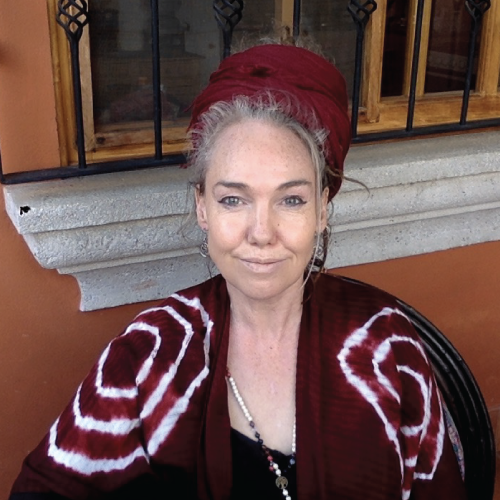
pADMA KHANDRO VICTORIA SINCLAIR
Padma Khandro was attuned to work with entities, extractions and exorcisms over 25 years ago and has worked globally for almost 20 years in diverse settings.
She has trained with curanderos, energy medicine specialists, Dharma lineage holders and has conducted earth work and ceremonies to work with spirit interference and liaison extensively.
From a lineage of spiritual warriors Padma has worked in a non-sectarian nature since childhood and thus holds a non-dualistic and compassionate position when working with beings across different realms. On a daily basis she works with non-incarnate energies, entities and unattached burdens.
She works with numerous elders and wisdom-keepers on a global level in communication with the unseen realms and is often brought is as the ‘ambassador with speech’ for her ability to converse across the realms. This is always done from a non-manipulative ‘white magic’ perspective and well-being and appointment for all beings to a state of belonging and right ecosystem is the paramount objective in all cases for the good of all.
Maaike de Haan
Maaike de Haan is an art therapist and holistic practitioner with a foundation in energy medicine and teaching background in higher education, who has devoted her life to studying and working within the Healing Arts. She’s a Dharma STARS co-founder, course contributor and senior practitioner for the platform.
Maaike weaves a fusion of modalities, anchoring her natural intuitive, empathic and multidimensional gifts in psychotherapeutic training and initiations into ancient wisdom and energy medicine lineages, resulting in a grounded holistic and trauma-informed approach.
Maaike is a Quantum Transfiguration practitioner (level 2), Reiki Master [Usui/ Tibetan tradition] and Sekhem Master/ Teacher initiate, who has studied specialisms in Energetic Hygiene & Clearings, Spaceholding, Earthkeeping and Death, Dying & Transitions, with her teacher Padma Khandro Victoria Sinclair – who she has been travelling and working with extensively in Mexico, Asia and Europe for the past 4+ years.
Maaike has been initiated into working with several plant teachers/ allies over the years, incl. Blue Lotus and Tobacco. She is trained to do Sananga assisted clearing work also.
Maaike currently works as a resident art therapist with children and teenagers, as part of a multi-disciplinary team at a specialised therapy practice in the North of the Netherlands, in addition to being a Dharma STARS senior practitioner working internationally online and in-person. She is currently developing Quantum Art Therapy as a modality, under the supervision of Victoria Padma Khandro – since 2022.
Maaike is available for (Quantum) Art Therapy, Inner Child and (related) Trauma work, Quantum Transfiguration, Sekhem energy healing and deep Clearing work of people and spaces. Maaike is also able to work remotely.
